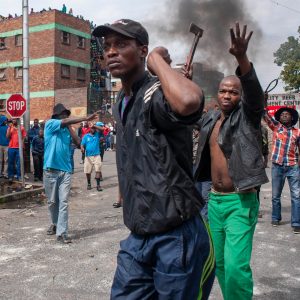Migrants have a target on their backs
Are migrants fated to become in the 2020s what Jews were in the 1930s as the Covid-19 pandemic escalates social tensions, and people look for someone to blame?
Author:
28 August 2020

On Sunday 23 August, a newspaper published – under the headline “SA under foreign control: Bleak future on jobs front for many after lockdown as companies turn to exploiting foreign migrants” – probably the most virulent media attempt to stir up hatred against migrants since South Africa became a democracy. While one newspaper article does not make a social trend, there are reasons to fear that it was a taste of things to come.
The South African media treat the economic devastation wreaked by the Covid-19 pandemic as a problem only this country is experiencing, but the entire planet is dealing with economic pain. There is a growing consensus that this will not be fixed quickly and that much of the globe faces years of economic hardship as bad as, if not worse than, the Great Depression of the 1930s.
Some say this will trigger action against poverty and inequality, which have greatly worsened the damage done by the coronavirus. But the 1930s showed that economic hardship can be a boon for peddlers of hate, who grab the opportunity to blame the pain on a manufactured enemy. The politics of violence and bigotry is particularly strong at the moment and it would be a huge surprise if the next few years do not see concerted attempts to whip up hate by blaming the loss of jobs and incomes on a manufactured enemy.
Related article:
In the 1930s, that enemy was the Jews and the result was the Nazi genocide in which millions were murdered simply because they were born into the “wrong” group. But who is the “enemy” likely to be this time?
Jews are now an unlikely target. Hatred directed at Jewish people is on the rise, as evidenced by white supremacist attacks on synagogues in the United States and Germany. But it does not galvanise the merchants of hate in the way it did in the 1930s. The right wing, which usually spreads hatred of Jews, admires Israel, a kindred spirit. This does not mean right-wingers have given up their prejudice against Jews, but it does make it difficult for them to mobilise as the Nazis did.
Potential ‘enemies’
Chinese people are an obvious “enemy”. US President Donald Trump insists on calling Covid-19 the “China virus”. But hatemongers are bullies, too, and so they pick on the weak, not the strong. Beating up on people whose home country boasts the second-largest economy in the world and a particularly large army is not a winning proposition, which is why growing anger at China in the West is more likely to provoke a new Cold War than violent attacks on people.
Related article:
Muslims are targets of hate. In India, they have been blamed for the coronavirus because they are said to have held gatherings that spread Covid-19. But outside India, Islamophobia triggered by Covid-19 has been a non-starter.
Hatred is manufactured, but not out of thin air. Stereotypes persuade people to hate only once they have been cemented over time, so that the false labels slapped on people make sense in times of stress. Muslims have been demonised as spreaders of violence, for example, not disease. Not even Trump has tried to pin Covid-19 and the economic ruin wrought by the pandemic on them, making it difficult to see this particular canard gaining traction.
That leaves perhaps the most stereotyped group on the planet right now, migrants.
Sadly, they tick all the boxes for post-coronavirus bigotry. Migrants are weakened and easy to bully. They are frequent victims of prejudice, just as Jews were for decades in Europe before Nazism. They have been labelled as spreaders of disease as well as stealers of jobs and opportunities, making them an almost automatic scapegoat.
Prime targets
It is easy to see the international travel bans imposed around the world in response to Covid-19 inspiring a message of hate that blames people crossing borders for the pain. In South Africa, the arrival of the coronavirus prompted instant demands to keep people from elsewhere in Africa out of the country, despite the fact that the virus was imported by affluent residents returning from an overseas holiday.
The Sunday newspaper article shows how a lack of jobs, which in reality is the product of the failure of many who hold political and economic power to respond to a pandemic, can be blamed on “job-stealing” migrants.
The story also highlighted another reality, that migrants are about the only group likely to whip a sizeable number of South Africans into a frenzy of hate. Migrants may face the wrath of bigots across the globe, but they are prime targets in this country.
Race is the key divide in South Africa but, for several reasons, racial tensions do not trigger the spasms of hatred white residents have long feared. This ensures that religious differences are not an important fault line and so campaigns against Muslims or Jews would win little support. While Chinese people have been targets of hostility, this remains isolated and it’s difficult to see anyone fomenting a mass campaign against the Chinese community.
Related article:
But migrants are almost an instinctive target in South Africa. The newspaper story maligning them was apparently prompted by an anti-immigrant hate campaign on social media.
Mainstream politicians, who like to denounce xenophobia, bear much of the responsibility for this as they have repeatedly portrayed migrants as a problem. Currently, this is true across the political spectrum.
ANC and DA leaders have blamed migrants for just about every difficulty, while former Johannesburg mayor Herman Mashaba – whose new political party has been anointed the new messiah in mainstream and social media – spent much of his term whipping up anti-immigrant sentiment. The only exception now is the EFF, but its attacks on state capture beneficiaries the Guptas and Minister of Public Enterprises Pravin Gordhan have been rank with anti-Indian stereotypes.
Their messages have made demonising migrants a mainstream South African bias. It is important to stress that we don’t know how people at a grassroots level feel about migrants, because they are never asked. A consistent voice against hatred of migrants is that of shack dwellers’ movement Abahlali baseMjondolo. But among the political elite and those who dominate the debate in mainstream and social media, blaming migrants is a constant theme.
Voices need to be raised
Because of this, there is a strong prospect that economic hardship here and in many parts of the globe will heighten already strong hostility towards migrants in the next few years. And in South Africa, the prospect of violence against migrants is extremely high.
Related article:
This is not inevitable, but there is a pressing need – among all the other pressures Covid-19 has created – for those who reject hate to start making it clear now that migrants are not the cause of our current woes. Or, indeed, of those before the coronavirus arrived.
There is an urgent need to stress that the way to recovery lies not in blaming the innocent but in demanding that those in power do better at overcoming the disease that caused the problem, and in addressing the economic and social weaknesses it worsened but did not create.
The Covid-19 pandemic has imposed many tasks on society. Loudly standing up to anti-immigrant prejudice to prevent new outbreaks of violence is one of the more urgent.




